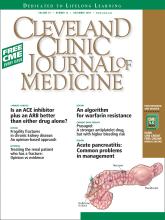Index by author
Bartholomew, John R.
- You have accessAn algorithm for managing warfarin resistanceOlusegun Osinbowale, MD, MBA, RPVI, Monzr Al Malki, MD, Andrew Schade, MD, PhD and John R. Bartholomew, MDCleveland Clinic Journal of Medicine December 2009, 76 (12) 724-730; DOI: https://doi.org/10.3949/ccjm.76a.09062
Some patients need higher-than-expected doses of warfarin to reach their target INR. The cause can be acquired (poor compliance, drug interactions) or hereditary.
Coco, Maria
- You have accessTreating the renal patient who has a fracture: Opinion vs evidenceMaria Coco, MD, MSCleveland Clinic Journal of Medicine December 2009, 76 (12) 684-688; DOI: https://doi.org/10.3949/ccjm.76a.09075
The patient with chronic renal disease who has a fracture remains a unique management challenge. Opinions on treatment abound, but without adequate evidence to back them up.
Lazar, Lawrence D.
- You have accessPrasugrel for acute coronary syndromes: Faster, more potent, but higher bleeding riskLawrence D. Lazar, MD and A. Michael Lincoff, MDCleveland Clinic Journal of Medicine December 2009, 76 (12) 707-714; DOI: https://doi.org/10.3949/ccjm.76a.09116
Prasugrel (Effient) is faster and more consistent in its effects, but patients at high bleeding risk should still receive clopidogrel (Plavix).
Lincoff, A. Michael
- You have accessPrasugrel for acute coronary syndromes: Faster, more potent, but higher bleeding riskLawrence D. Lazar, MD and A. Michael Lincoff, MDCleveland Clinic Journal of Medicine December 2009, 76 (12) 707-714; DOI: https://doi.org/10.3949/ccjm.76a.09116
Prasugrel (Effient) is faster and more consistent in its effects, but patients at high bleeding risk should still receive clopidogrel (Plavix).
Malki, Monzr Al
- You have accessAn algorithm for managing warfarin resistanceOlusegun Osinbowale, MD, MBA, RPVI, Monzr Al Malki, MD, Andrew Schade, MD, PhD and John R. Bartholomew, MDCleveland Clinic Journal of Medicine December 2009, 76 (12) 724-730; DOI: https://doi.org/10.3949/ccjm.76a.09062
Some patients need higher-than-expected doses of warfarin to reach their target INR. The cause can be acquired (poor compliance, drug interactions) or hereditary.
Mandell, Brian F.
- You have accessLow bone density is not always bisphosphonate deficiencyBrian F. Mandell, MD, PhDCleveland Clinic Journal of Medicine December 2009, 76 (12) 683; DOI: https://doi.org/10.3949/ccjm/76a.12001
Low bone density is not a one-size-fits-all disorder. We need to carefully consider the diagnostic and therapeutic options before assuming that low bone density is osteoporosis.
Messerli, Franz H.
- You have accessIs an ACE inhibitor plus an ARB more effective than either drug alone?Franz H. Messerli, MD and Melana Yuzefpolskaya, MDCleveland Clinic Journal of Medicine December 2009, 76 (12) 693-696; DOI: https://doi.org/10.3949/ccjm.76a.09052
No. Dual renin-angiotensin system blockade has never been shown to reduce the rates of morbidity or death from any cause.
Miller, Paul D.
- You have accessFragility fractures in chronic kidney disease: An opinion-based approachPaul D. Miller, MDCleveland Clinic Journal of Medicine December 2009, 76 (12) 715-723; DOI: https://doi.org/10.3949/ccjm.76a.08108
When a patient with chronic kidney disease suffers a fragility fracture, a key question is whether the patient has osteoporosis or, instead, renal osteodystrophy. Bone densitometry does not help in this distinction.
Osinbowale, Olusegun
- You have accessAn algorithm for managing warfarin resistanceOlusegun Osinbowale, MD, MBA, RPVI, Monzr Al Malki, MD, Andrew Schade, MD, PhD and John R. Bartholomew, MDCleveland Clinic Journal of Medicine December 2009, 76 (12) 724-730; DOI: https://doi.org/10.3949/ccjm.76a.09062
Some patients need higher-than-expected doses of warfarin to reach their target INR. The cause can be acquired (poor compliance, drug interactions) or hereditary.
Parsi, Mansour A.
- You have accessAcute pancreatitis: Problems in adherence to guidelinesTyler Stevens, MD, Mansour A. Parsi, MD and R. Matthew Walsh, MDCleveland Clinic Journal of Medicine December 2009, 76 (12) 697-704; DOI: https://doi.org/10.3949/ccjm.76a.09060
Evidence-based guidelines on managing acute pancreatitis are available, but many physicians are not following them.




